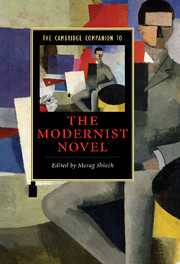3 - Remembrance and tense past
Published online by Cambridge University Press: 28 July 2007
Summary
This chapter will explore the link between time, modernism and the novel. In literary modernism it is the novel, almost alone among genres, which is typically linked to time and to innovations in the representation of temporality. Despite T. S. Eliot’s Four Quartets (1944) being about time, time is not a structural concept for poetry (excluding narrative poetry). This chapter will not discuss innovations in temporality as a response to aspects of modernity external to the novel itself, whether developments in the other arts, in philosophy, in scientific theory, in technology (including train travel, the synchronization of clocks, the telegraph, photography and the cinema) or in the organization of the work day under capitalism. Our specific concern is rather what in the formal properties and history of the novel makes it the one among literary genres in which the modernist preoccupation with time is worked out. The answers to this question will necessarily select among the various external theories of modernism and time those that best explain the novel’s internal development. For time is not simply a subject of the modernist novel; it governs its formal experiments. Just as, according to Michel Foucault, 'philology was to untie the relations that the grammarian had established between language and external history in order to define an internal history', a history internal to the novel can be isolated, alongside the novel’s role in history.
- Type
- Chapter
- Information
- The Cambridge Companion to the Modernist Novel , pp. 48 - 64Publisher: Cambridge University PressPrint publication year: 2007
- 2
- Cited by



